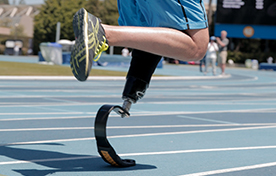Growing Up with Limb Loss
– by Élan Young
Men and women, young and old, all suffer the effects of amputation, including its physical and emotional scars. Adapting successfully to life with limb loss depends not just on one’s inner resolve or outward physical strength – sometimes it’s a matter of environment. Men may also suffer socially because of limb loss, but women are more often judged on appearance and are more likely than men to be identified socially with their bodies. However, concerns about unattainable expectations might be even more painful in light of the permanent and noticeable fact of a missing limb. Messages from society are often internalized, and have an impact on how people see themselves. The further women feel from society’s inflexible standard of beauty, the more likely their self-image will suffer. Growing up as a female with limb loss provides a unique perspective on how to adapt successfully through the many challenges of youth. The three women interviewed here may help other girls and women see how a positive self-image is worth so much more than the pursuit of an idealized image of perfection.
Lacey Henderson, 19, became an above-knee amputee at age 9.
Melissa Shaw, 37, has lived with a below-elbow limb loss since birth.
Lisa Thompson, 39, became a hemipelvectomy amputee at age 10
What issues did you face when you were growing up related to your limb loss?
Lacey: When I was younger, I had a hard time with kids picking on me. Eventually things got so bad that I moved to a different school.
Melissa: I didn’t ever feel like I couldn’t do things. My hard experiences were more around the emotional cost of feeling different. I was shy and I didn’t like calling attention to myself.
Lisa: As a 10-year-old girl with osteosarcoma, I shocked a lot of people with my demeanor because there was no crying or depression. I just wanted to get rid of the pain.
Melissa: The hardest time was in junior high. It also bugged me that it was hard to find cute formal dresses with long sleeves.
Lisa: In high school, I had friends, but I didn’t want to stand out. I skipped dances and the prom. I didn’t wear dresses. It wasn’t until college that my attitude changed and I began to accept myself more.
Do you think many amputees have poor body images? If so, what would you tell them to try to strengthen them
Lacey: I think that a lot of girls have a poor body image regardless of amputation. It’s hard trying to feel pretty when the media dictates what “pretty” is.
Melissa: I think body-image stuff is harder on girls than boys. There is so much focus and pressure around physical beauty. I think people are lying if they say their difference hasn’t affected their body image. It’s human nature.
Lacey: The only thing that you can change is how you feel about yourself. The more confident you are, then the more attractive you are in anything – dating, job interviews, school, presentations.
Melissa: I think it gets easier as you grow into yourself and get more confident about who you are. You just get more confident in your own skin and start to see how self-conscious everybody is in their own way.
Lisa: There’s so much emphasis on legs in the media, and that can contribute to poor body image for girls. Young women do not have to be defined by their amputation. I’ll admit, shopping for shoes is still one of the hardest things for me. I’ll end up buying the shoe or two pairs and try them on at home. I sometimes feel self-conscious trying it on in the store. But I wear dresses now and I don’t even care.
How would you advise amputee children who deal with children who tease or bully them?
Melissa: Humor usually works. Also, people are uncomfortable or nervous if you are uncomfortable or nervous. If they see you aren’t freaked out by questions, they’ll relax.
Lisa: It’s always going to be hard to deal with bullies. You just have to learn to have a thick skin. It’s important that young amputees learn how to accept and play with the hand they’re dealt in life. That includes how they respond to others. Life doesn’t end just because of a missing limb. For me, the experience was the beginning of a new life – full of obstacles, yes, but these obstacles have taught me how to be strong.
Lacey: If a child is feeling threatened, physically or emotionally, it’s important that they tell someone they feel comfortable with – a parent, teacher, sibling or friend. They need to know that bullies act the way they do because they are insecure themselves.
In middle school, a group of girls didn’t like me and they would draw ugly pictures of me or leave stuff on my locker. They put dissection frogs in my backpack. I even received death threats. I had been hiding all of this from my parents, because I wanted to be able to think that I could fix whatever it was that I was doing to make these girls be so mean to me. My mom finally found out, and pulled me out of the school immediately.
Melissa: I know mothers say it, but it’s true: The meanest kids are the ones putting other people down because they feel really badly about themselves. I just had a childhood bully contact me and apologize for being so cruel when we were kids. I never thought that would happen.
Lisa: I had more staring than teasing. At one stage, I got to the point when I would stare back. That became a way for me to show that they’re not perfect either.
What kind of resources or support would you have wanted when you were young?
Lisa: It would have helped to have a network or to have been part of an organization. I was a young adult before I met another amputee like me. I felt better then, like I wasn’t the only one.
Lacey: My family was an amazing resource for me. We became very close through my ordeals. My whole family is very athletic, so even post-amputation I was encouraged to be active – rock climbing, skiing, snow boarding, volleyball, soccer and track – and I started cheerleading in high school. I couldn’t control how people acted toward me, but I larned to control how I responded.
Melissa: My friends and family were great, but I never met anyone else who looked like me. I think it would have been amazing to have other kids my age to talk to who shared the same experiences. That’s probably why I love the Amputee Coalition Youth Camp so much. It’s hard to describe. It’s just cool to hang around so many other people with the same life experiences. I love seeing the arms and legs strewn everywhere by the pool. I wish every child with a limb difference could come to this camp.
What can parents do to help their children
Lisa: Parents should have lots of communication with their child. Don’t assume that the child is over it. Keep the communication open and keep encouraging them. Also, try to find a support network.
Lacey: They should encourage their kids to take up a hobby or sport, or join a club. Kids need a way to get everything out and to destress. Parents should always be a safe-zone for their kids to be able to tell them things that are going on.
Melissa: Be supportive and encouraging, but not pushy. I know my family only wanted the best for me, but there were times when I didn’t feel like doing something just to show I could. For example, my dad tried really hard to teach me to water-ski. I’m sure I could have learned how to do it, but I hated it. I would have rather been towed on an inner tube. I remember toughing it for hours for him. That’s not to say I think amputees shouldn’t try different activities, even if they are hard, especially with the number of adaptive resources available. But as I’ve gotten older, I’ve gotten less focused on “proving” anything to others or trying to “make up” for my differences. It’s become easier to just say, “That’s not my thing.”
Lacey:Overprotective parents don’t help, but parents need to know when bullying gets out of hand. If their child is distraught by what’s going on, then they should be taking a closer look at their child’s friends, text messages, MySpace pages – whatever. Bullies aren’t stupid. They play dirty and they play under the adult radar. Parents need to stay involved without being too intense.
Melissa: For parents, it must be absolutely wrenching to see their child get teased or treated differently, but it’s important for children to learn their own style for coping. Definitely talk to the teachers if you think there’s a bullying issue.
Disclaimer: The following information is provided and owned by the Amputation Coalition of America and was previously published on the website http://www.amputee-coalition.org or the Coalitions Newsletter, inMotion.








